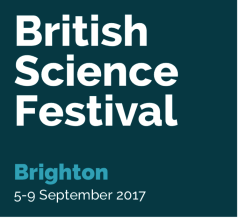 The British Science Festival is organised annually by the British Science Association, and this year it’s hosted by the University of Brighton and the University of Sussex from Tuesday 5 to Saturday 9 September. For more details and full listings, see the main British Science Festival website.
The British Science Festival is organised annually by the British Science Association, and this year it’s hosted by the University of Brighton and the University of Sussex from Tuesday 5 to Saturday 9 September. For more details and full listings, see the main British Science Festival website.
We’ve pulled out some of the mathematics-related events in the main programme – from theatre reproductions to puzzle workshops and plenty of talks and lectures, there’s something for everyone!
Invisible mathematics
Tuesday 5 September, 13.00 – 14.00
W100, Westlain Building, Falmer Campus, University of Brighton
Daniel Colquitt (University of Liverpool) researches the mathematics of invisibility. Invisibility cloaks have been created for light, sound and water. If we can make all these invisible, what else can we design cloaks for? It was once hoped that invisibility cloaks would allow us to protect buildings from earthquakes, but it was deemed impossible. Discover how mathematics provides us with an elegant solution.
The million-dollar shuffle: symmetry and complexity
Mathematical Sciences Section Presidential Lecture & Reception
Tuesday 5 September, 15.30 – 16.30 (followed by drinks reception)
Gardner Tower, Attenborough Centre, Brighton BN1 9RA
The code-breaker Alan Turing kicked off the study of what problems can be solved by computers. Many of them become easier when they have symmetries: finding a route is easier in a city with a grid of streets than in one with a chaotic layout. Colva Roney-Dougal explores how mathematics can be used to crack symmetrical problems, and shows that sometimes symmetry itself is the issue.
The reception following the event is sponsored by the London Mathematical Society.
The winner shouldn’t take it all
Wednesday 6 September, 12.00 – 13.00
C218 Checkland Building, Falmer Campus, University of Brighton
Exceptional performances tend to occur in exceptional circumstances, but people often mistake luck for skill when evaluating these outliers. This has led Chengwei Liu to argue that perhaps we should be rewarding second place. With evidence from the sporting world and business, Chengwei ponders that skill, in the face of luck, may not be all it’s cracked up to be.
Picturing problems
Thursday 7 September, 11.30 – 12.30
Gardner Tower, Attenborough Centre, Falmer Campus, University of Sussex
From assembling Ikea furniture to complex computing, using intuitive shapes and diagrams can open up new opportunities for communicating and solving problems. If you enjoy puzzles come and find out from John Howse how diagrammatic reasoning can improve your problem solving and see if you can crack some fiendish challenges.
Drugs, condoms and the theory of experimentation
Friday 8 September, 13.30 – 14.30
A1, Asa Briggs Arts, University of Sussex
How do we develop drugs that prevent HIV transmission? The answers are clinical, political, personal and statistical. Yet not everyone “does statistics”, meaning their voices are lost in debates about research and treatment. Robert Cuffe will help you spot bluff masquerading as statistical expertise in science, with focus on HIV prevention.
The Mathematikado
Friday 8 September, 16.00 – 17.00
C122 Checkland Building, Falmer Campus, University of Brighton
The Mathematikado, produced and performed by female students in 1886, parodied Gilbert and Sullivan’s The Mikado to argue that women could master college-level maths. Find out how female students of maths and science responded to social critique of their participation in traditionally male fields of study.
The future of abdominal aneurysm treatment
Friday 8 September, 16.30 – 17.30
A2, Asa Briggs Arts, University of Sussex
Abdominal aneurysms are often symptom-less and can be life-threatening if not spotted early. Alexander Movchan and Luca Argani (University of Liverpool) describe a distinctive new model used to combat abdominal aneurysms known as ‘EVAS’. Discover the future of EVAS and how it is impacting on treatment for the disorder.
Born to Sum
Friday 8 September, 17.00 – 17.45
Horatio’s Bar, Brighton Palace Pier
Folk mathematician and 2016 FameLab winner, Kyle Evans and his trusty guitar take you on a comedic musical tour through some unexpected parallels between maths and pop culture.
Male fertility: do the maths
Saturday 9 September, 15.00 – 16.00
Old Courtroom Theatre, Brighton
Hermes Gadelha (University of York) applies mathematics to understanding what makes “good” sperm and envisions how this will impact, if not revolutionise, our understanding of fertility; from treatments to contraceptives, and even the development of “robo-sperm”.